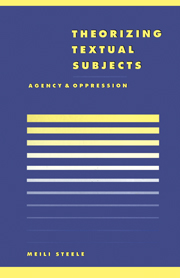Book contents
- Frontmatter
- Contents
- Acknowledgments
- Introduction
- 1 Stories of oppression and appeals to freedom
- 2 Language, ethics, and subjectivity in the liberal/communitarian debate
- 3 Theorizing narratives of agency and subjection
- 4 Truth, beauty, and goodness in James's The Ambassadors
- 5 The subject of democracy in the work of Ralph Ellison
- Conclusion
- Bibliography
- Index
Conclusion
Published online by Cambridge University Press: 06 July 2010
- Frontmatter
- Contents
- Acknowledgments
- Introduction
- 1 Stories of oppression and appeals to freedom
- 2 Language, ethics, and subjectivity in the liberal/communitarian debate
- 3 Theorizing narratives of agency and subjection
- 4 Truth, beauty, and goodness in James's The Ambassadors
- 5 The subject of democracy in the work of Ralph Ellison
- Conclusion
- Bibliography
- Index
Summary
In order to summarize and extend the conclusions of my argument about agency, value, and interpretation, I will return to the debate on liberal education that opened the book and recharacterize the issues at stake. I look at the debate as a theoretical as well as an ethical/political conflict about the reproduction of the subjects of democracy, not the static question of the canon or the question of teaching negative liberty.
As we recall from the Introduction, conservatives such as Bloom and Bennett maintain that the curriculum needs to be centered around the canonical texts of the Western tradition if our society is to have social, and philosophical coherence. Without such a commitment, they say, we will lose not only our common culture but the philosophical moorings that keep us from falling into relativism. Conservatives aim their attacks not just at radicals (poststructuralists or Marxists) but at liberals as well; for conservatives, Liberalism's neutrality toward the good is too skeptical to resist the forces of relativism and nihilism. Radicals respond that conservative and liberal agendas propose exclusions and repressions that are manifestly undemocratic. It is not just that teaching canonical works does not represent the diversity of American historical experience but that teaching the canon in a hagiographic fashion leaves out the stories of power that are coextensive with the development of American culture.
- Type
- Chapter
- Information
- Theorising Textual SubjectsAgency and Oppression, pp. 204 - 209Publisher: Cambridge University PressPrint publication year: 1997



